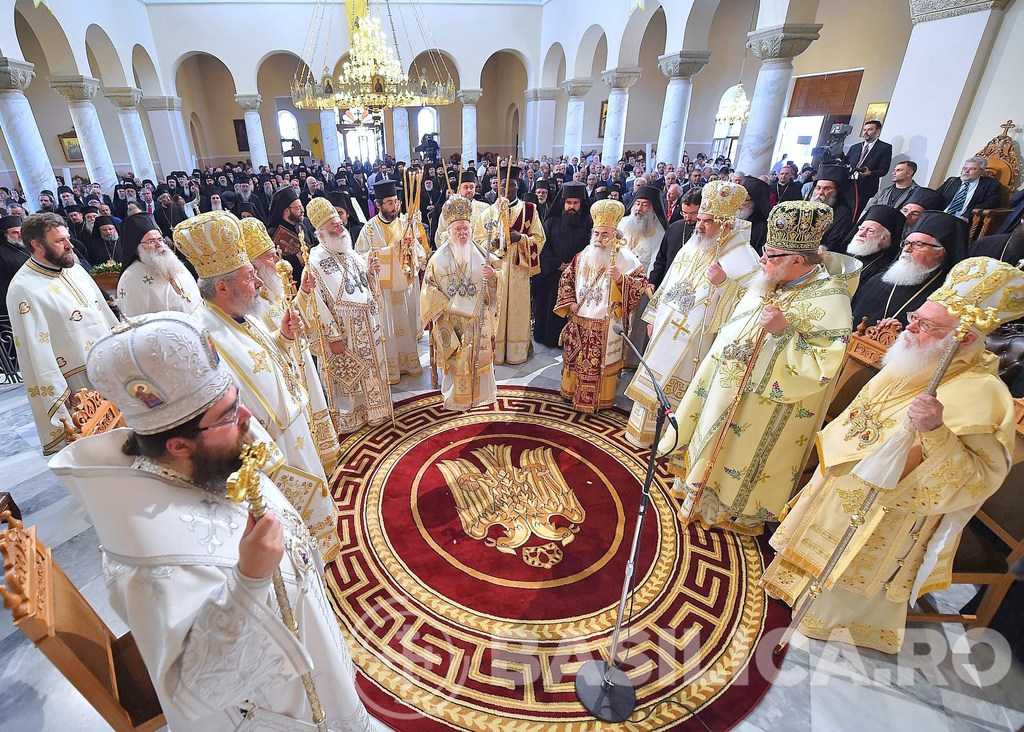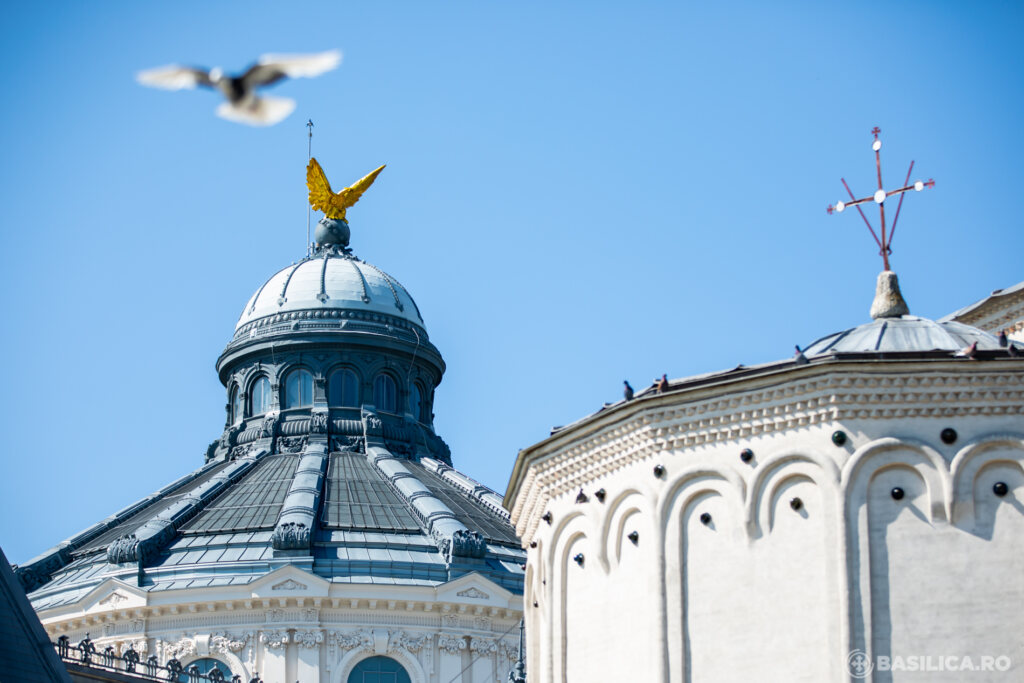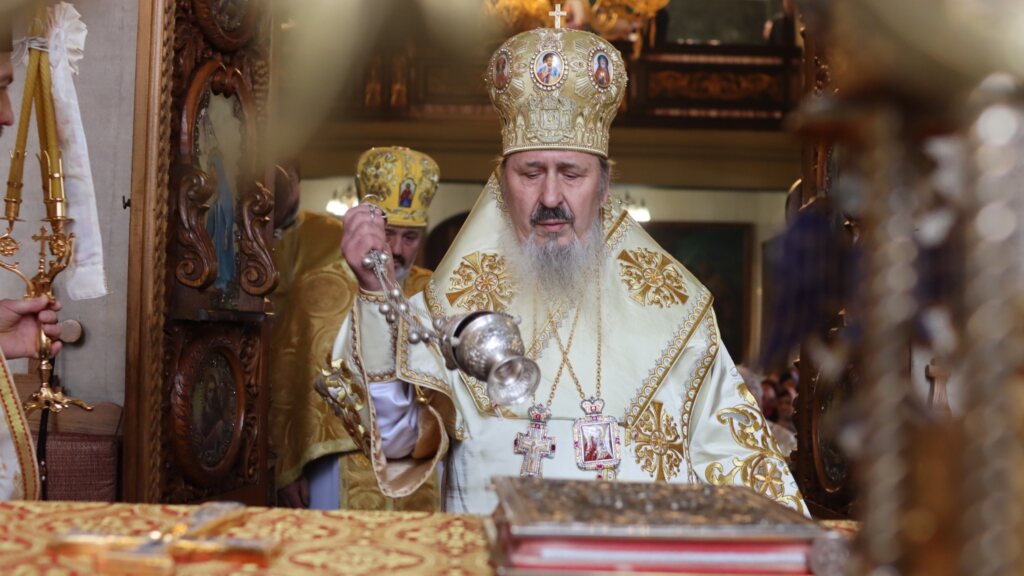Please find below the position of the Holy Synod of the Romanian Orthodox Church about recent evolutions in Romania regarding reception of the Holy and Great Council of the Orthodox Church (Crete, 2016):
During the working session of the Holy Synod of the Romanian Orthodox Church, gathered on Friday, 16 December 2016, under the chairmanship of His Beatitude Patriarch Daniel, in the Synodal Hall of the Patriarchal Residence, the Holy Synod noted with sorrow the recent evolution of negative reactions regarding the reception in Romania of the Holy and Great Council of the Orthodox Church (Crete, 2016).
The Romanian Patriarchate has stressed several times the fact that “the Council in Crete did not formulate new dogmas, but rather professed that the Orthodox Church is the One, Holy, Catholic and Apostolic Church of Christ”, and has constantly urged that peace and unity of the Church be retained with all responsibility, recalling the words of Saint John Chrysostom saying that “nothing provokes God’s anger more than the division of the Church! Even if we would have achieved ten thousand glorious acts, yet we who cut to pieces the fullness of the Church suffer punishment no less sore than they who mangled His body” (St John Chrysostom, Homily 11 on Ephesians, PG 62, 85).
However, we note with sorrow in our soul that, in a fanatical and harmful manner, some rebellious people misled certain clerics and faithful stating falsely and denigratingly that the Council in Crete has proclaimed ecumenism as dogma of faith, and some clergy, believing this falsehood, uncanonically interrupted the liturgical remembrance of their bishop, thus disturbing the peace and unity of the Church by their divisive attitude.
The Holy Synod of the Romanian Orthodox Church stressed that nor the Council in Crete neither some other Orthodox Synod has declared ecumenism as a dogma of faith, in the same way as no canonical Orthodox Synod has ever declared ecumenism as being “pan-heresy”. Therefore, the accusations brought by opponents of the Council in Crete are unjust, irresponsible, and harmful for the unity of the Church.
From an Orthodox point of view, lucid ecumenism does not represent a dogma of faith, but a spiritual attitude of dialogue and cooperation between Christians, instead of controversy full of confessional hate and of violent confrontation, which has been manifested for several centuries during the history of Christianity. The ecumenical movement came into being at the beginning of the 20th century, when western Christian missionaries preached the Gospel of love to non-Christian peoples of Africa and Asia, while Christians were divided themselves in many antagonistic Christian confessions, hating and contesting each other, their attitude being a negative missionary witness in front of other religions and the civil society. Although taking part in this movement of dialogue among Christians of different confessions, the Orthodox Church considered that the unity of non-Orthodox Christians divided among themselves over time can be restored only on the basis of the faith of the undivided Church of Christ, which is the Orthodox Church, the One, Holy, Catholic and Apostolic Church that we confess in the Orthodox (Nicene-Constantinopolitan) Creed.
In this sense, the Orthodox Church considers that in the dialogue with other Christians it brings exactly the witness of the One Church of Christ, from which they separated over time by deviation from Orthodox faith. Of course, no Orthodox Christian is ever obliged to carry dialogues or to cooperate with other Christians if he or she is afraid of losing the Orthodox faith. At the same time, it is unfair to consider that all Orthodox Christians who carry theological dialogues and cooperate in practical matters in society with Christians of other confessions are traitors of Orthodoxy. A peacemaker Orthodox Christian can remain faithful to Orthodoxy without becoming fanatic, if he or she confesses Orthodox faith in dialogue with other Christians, provided he or she makes no compromise.
Furthermore, the Holy Synod noted with surprise the uncanonical and aggressive attitude of certain theologians and clerics (priests and hierarchs) from two sister Orthodox Churches, who came in dioceses of the Romanian Patriarchate in order to criticise its hierarchy and to instigate some clergy and faithful to disobey the hierarchs of our Church. For this reason, the Holy Synod of the Romanian Orthodox Church has decided to inform the Primates of the sister Orthodox Churches (Moscow Patriarchate and the Orthodox Church of Greece) about the situations in which some of their priests and hierarchs carry out uncanonically aggressive and turbulent activities in the dioceses of the Romanian Patriarchate, inciting to disobedience, rebellion and separation.
The clergy, monastics and lay people involved in actions of rebellion and denigration of the Council in Crete, ignoring the fact that a Synod can be judged only by another Synod, will be called to order by peaceful dialogue and canonical explanation about the gravity of disunion and of disturbing the peace and unity of the Church. In the same manner, disciplinary administrative and canonical sanctions will be applied in order to bring to order clerics, monastics and lay people who persist in their state of rebellion and disunion, troubling the peace and unity of the Church.
It has also been recalled that if the synodal Fathers who participated in the Second Ecumenical Council (381) made 3 omissions and 10 additions or amendments to the text of the Creed formulated by the Holy Fathers of the First Ecumenical Council (325), in order to clarify and complete the initial Synodal text, all the more a future Holy and Great Council of the Orthodox Church can explain, nuance and develop the documents formulated and approved by the Council in Crete, in order to avoid misinterpretations that harm the peace and unity of Christ’s Church. In this regard, it is also noteworthy the decision of the Holy Synod of the Bulgarian Orthodox Church which, even though brought certain critical observations and proposed future amendments to some documents of the Council in Crete, decided: “to maintain fraternal, Eucharistic, spiritual, dogmatic and canonical communion with all local Orthodox Churches – both with those who participated in the Council in Crete and with those who did not participate”.
In conclusion, any explanation regarding the exposition of Orthodox faith must be given within ecclesial communion, not in a state of rebellion and disunion, because the Holy Spirit is, at the same time, the Spirit of Truth (cf. John 16:13) and the Spirit of fellowship or communion (cf. 2 Corinthians 13:13).
Press Office of the Romanian Patriarchate
***
Представляем ниже позицию Священного Синода Румынской Православной Церкви в связи с недавними отзывами в Румынии ко Святому и Великому Собору Православной Церкви (остров Крит, 2016 г.):
В рабочем заседании Священного Синода Румынской Православной Церкви, которе состоялось под председательством Блаженнейшего Патриарха Румынского Даниила, 16 декабря 2016 г., в Синодальном зале Патриаршей Резиденции, с печалью отметились недавние события в Румынии в связи с негативными реакциями на решения Святого и Великого Собора Православной Церкви (остров Крит, 2016 г.).
Румынская Патриархия неоднократно подчеркивала, что “ Собор на острове Крит не сформулировал новые догматы веры, а свидетельствовал, что Православная Церковь является Единой, Святой, Соборной и Апостольской Церковью Христа” и побуждал постоянно к сохранению мира и единства Церкви, с полной ответственностью, по слову святителя Иоанна Златоуста, который говорит, что « ничто не может оскорбить Бога больше, чем разделение Церкви! Даже если мы совершили бы тысячи хороших вещей, мы, те которые раздробляем церковную полноту, не менее виновны чем те, которые распяли Его Тело “ (Иоанна Златоуста Проповеди на послание Апостола Павла к Ефесянам , 11, PG 62, 85).
Тем не менее, мы с грустью в душе констатируем, что, страстным и вредным образом, мятежные люди ввели в заблуждение некоторых священнослужителей и верующих, ложно и порочным образом заявляя, что Критский Собор провозгласил экуменизм в качестве догмата веры, а некоторые священнослужители, веря в эту неправду, неканоничным образом прервали духовную связь с местными архиереями и тем самым нарушили мир и единство Церкви.
Священный Синод Румынской Православной Церкви указал, что ни Критский Собор, а также никакой другой православный собор не заявляли, что экуменизм – это догмат веры, так же как ни один канонический православный собор никогда не завлял, что экуменизм является «всеересью». Поэтому обвинения противников Критского Собора являются несправедливыми, безответственными и вредными для единства Церкви.
С православной точки зрения, прозрачный экуменизм не является новом догматом веры, а духовным отношением в диалоге и сотрудничестве между христианами, который сменил полную конфессиональной ненависти и насильственной конфронтации полемику, проявленную веками в христианской истории. Экуменическое движение родилось в начале 20-го века, когда западные христианские миссионеры проповедовали Евангелие любви нехристианам в Африке и Азии, в то время как христиане были разделены на многие противоречивые христианские деноминации, которые ненавидели и оспаривали друг друга. Их отношение не могло быть положительным миссионерским свидетельством перед другими религиями и перед общесвенностью. Принимая участие в этом движении диалога между христианами разных конфессий, Церковь считает, что восстановление христианского единства инославных, разделенных с течением времени, можно достигнуть только на основе веры неразделимой Церкви Христовой, которая есть Единая, Святая, Соборная и Апостольская Православная Церковь, так как мы свидетельствуем в православном символе веры (Никеоконстантинопольским).
В этом смысле Церковь считает, что в диалоге с другими христианами она приносит только свидетельство о Единой Церкви Христовой, от которой они были разделены со временем, отклоняясь от православной веры. Конечно, ни один православный христианин не обязан войти в диалог или сотрудничать с другими христианами, если он боится потерять правослваную веру. Однако, несправедливо считать, что все православные христиане, которые участвуют в богословском диалоге или сотрудничают на практическом уровне в общественной жизни с христианами других конфессий, являются предателями Православия. Мирный православный христианин может сохранить верность Православию, не становясь фанатиком, если он исповедует православную веру в диалоге с другими христианами, без компромиссов.
Также, Священный Синод с удивлением отметил неканоничное и агрессивное отношение некоторых богословов и священнослужителей (священников и архиереев) двух братских Православных Церквей, которые приезжали в епархии Румынского Патриархата и критиковали священноначалие, а также побуждали священнослужителей и верующих к непослушанию архиереям нашей Церкви. Поэтому, Священный Синод Румынской Православной Церкви решил донести к сведению Предстоятелям этих Православных Церквей (Московский Патриархат и Эладская Православная Церковь) те ситуации, когда некоторые священники и архиереи развертывают неканонические и агрессивные действия в епархиях Румынского Патриархата, подстрекая его паству к неповиновению, мятежу и разделению.
Священники, монахи и миряне, участвующие в мятеже и порочащие Критский Собор, игнорируя тот факт, что Собор может осуждаться только другим Собором, будут призваны к поправлению с помощью мирного диалога и канонического уведомления о тяжести разделения и нарушение мира и единства Церкви. Аналогичным образом, административные и канонические наказания будут применяться к поправлению священнослужителей, монашествующих и мирян, которые упорствуют в состоянии мятежа и разъединения, нарушая мир и единство Церкви.
Было также упомянуто, что если Святые Отцы, принимавшие участие во Втором Вселенском Соборе (381 г.) сделали 3 упущения и 10 добавлений или поправок к тексту Символа веры, сформулировонного Cвятыми Отцами Первого Вселенского Собора (325 г.), в целях уточнения и пополнения изначального соборного текста, тем более в будущем другой Святой и Великий Собор Православной Церкви сможет объяснить, подчеркнуть и разработать сформулированные и утвержденные Критским Собором документы, во избежение неправильных толкований, разрушающих мир и единство Церкви Христовой. В связи с этим, следует отметить решение Священного Синода Болгарской Православной Церкви, который, хотя и имеет некоторые критические замечания и предложил поправки к некоторым документам Критского Собора, однако решил «сохранить со всеми Поместными Православными Церквами братское, евхаристическое, духовное, догматическое и каноническое общение, как с теми которые участвовали в Критском Соборе, также и с теми, которые не участвовали».
В заключенит, подчеркиваем, что любые разъяснения в связи с изложением православной веры должны обговариваться в рамках церковного общения, а не в состоянии мятежа и разделения, потому что Святой Дух является, в одно и то же время , Духом Истины (Иоанн 16, 13) и Духом общения (2 Кор. 13, 13).
Пресс-служба Румынской Патриархии






